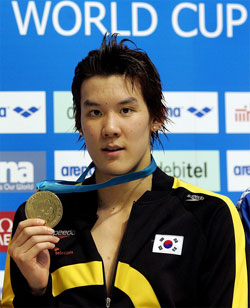Today, a friend pointed out a glaring omission in my ongoing discussion about Korea: its coverage of the Olympics. In the run-up, the ex-pats that I’ve talked to warned me that the events that would be broadcast would be obscure Korean-dominated sports. It has been as I was warned.
Here’s a list of sports Koreans medalled in (as of 8/22/2008):
- Judo
- Taw-kwon-do
- Archery
- Badminton
- Table Tennis
- Shooting
- Weightlifting
- Fencing
- Swimming
- Gymnastics
In addition to the above sports, I also saw a lot of baseball and handball. It was actually my first time ever seeing a game of handball, and I’d be okay if it was the last game I ever saw.
So, with a few exceptions, most of the Korean broadcast has been heavily tilted toward those above, mostly obscure sports. I don’t want to diminish the achievement or anything. I mean, man if you are good at handball, then I’m sure you want everyone to watch you too. However, most of the sports that Korea is good in aren’t big spectator sports.
Take for example, table tennis. Below is Dang Ye-seo, Korea’s star women’s star table tennis, another sport I’ve never seen on TV except in Korea. In table tennis—the ritualistic prep of the serve usually takes longer than it takes to score. Its kinda boring to watch.

I did get to see Michael Phelps win about half of his medals. It just so happened that most of his events were live about 11 in the morning here, right when I’m getting ready to go to work. However, I seriously wonder if they’d show many aquatic events at all if Korea didn’t have its own star, Park Tae-Hwan in the sport.

Unlike the broadcast system in the US, where the major networks bid against each other for exclusive rights, here, broadcast rights were shared among three networks, each with multiple channels. When I heard about that I thought it was great. They’d take turns showing the big gold medal matches, and then get to show some diversity on the other channels. I was wrong. When flipping through the channels, often three of the channels were showing the exact same events, with the exact same camera shots and everything!
A op-ed piece in the Korean times written by a native-speaking English teacher had this to say:
There were in fact seven Korean TV stations on air late Friday night (Aug. 15) at the time in which the finals in men's shot put and women's 10,000m were scheduled. Three of the stations aired the Korean-Chinese badminton doubles gold medal final, and the other four showed replays, countless times, of Korean participants.
How many times do Koreans have to see their champions in action before they're convinced they've won? Are the producers of Korean TV sports programming really that narrow minded, if not in fact ethnocentric? Isn't there even a little interest in any event that doesn't involve Koreans?
Now, about the ethno-centric comment, I don’t know if that’s a problem. Each country covers the games in a manner to suit their country, and that’s the way it should be. Another op-ed piece in the JoonAng Daily had an opposite stance. It was written by a Korean high school student, who has been no-doubt whipped up into a nationalistic fervor over the recent tension over Dokdo/ Takeshima/ Liancourt Rocks*:
Also, I found out that archery has only 4 gold medals while swimming has 24 gold medals. Why such a difference? Then I heard that there used to be many more medals for archery but that was changed since South Korea gets all the medals in archery.
Why indeed does swimming have so many medals at stake? Many Americans tend to win them. The United States, which is the most powerful country in the world, must want to win as many medals as possible. So I guess they made some effort to achieve that.
I hope that most Koreans don’t really believe this—that somehow an American conspiracy has taken away the chance for Korea to rack up medals in archery. Five minutes of research at Wikipedia showed this wasn’t the case. The fact is that there were a lot of medals for archery, but only in the 1920 games. In 1920 there were 10 medals for archery, but Korea didn’t even compete (they were occupied by Japan at the time).
In 1972, archery was added as a regular sport. When Korea hosted the Olympics in 1988 they even added two events—the men’s and women’s team competitions.
So, I think you can see, the Korean view of the Olympics puts archery at the top, any sport that a Korean is competing in a close second, and then everything else, a distant afterthought relegated to a late-night highlight reel.
That’s pretty much it.
Oh, I think you should see the matching hot-pink blazers that one set of Korean anchors were wearing the other night. They shared their set with giant stuff animals in the shape of the 2008 Olympic mascots (the stuffed animals are just below the shot, in front of the desk on the floor).
Pic from doctor99106
Korea wins the gold medal in synchronized cheese!
---
*When I was teaching English in the public schools last year, my regularly scheduled English lesson was pre-empted for a packaged propaganda lesson from Seoul to educate kids that these rocks are indeed Korean territory.
Update August 23, 2008
Korea just won the gold medal for baseball. I didn’t watch it on TV, but I heard it. I was sitting quietly at my computer working on my sermon when I heard cheers. It wasn’t anyone in my hall—there’s only a few people living here now and they are not home. But it seems to have come from everywhere. I looked out the window and every apartment across the way that had its lights on seemed to be watching the celebration on TV.
In an earlier event, 42% of Korean households were watching the Olympics. That’s an amazing number. I wonder how many were watching tonight when I heart the shouts.






No comments:
Post a Comment
I appreciate comments. If you have a personal message to me, then e-mail would be best.